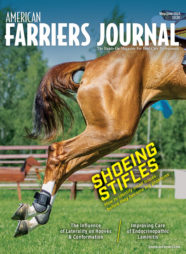Q. Should farriers sedate clients’ horses for hoof care is a continuing question in the industry. Farriers, equine veterinarians and horse owners share their thoughts in a recent American Farriers Journal social media post.
“I have a new pony who has a lot of anxiety. She hasn’t always been good for my farrier. I am working on her reactions to things. She is now on Regu-Mate, and I gave her a half dose of Trazodone yesterday for the farrier. She is better each time.”
— Renee Voshell Binkley, Middletown, Del.
“I’ve witnessed a 2-year-old Thoroughbred that had been drugged so much during her first year for her feet that she was totally cooked. You should only use sedation in emergency situations. Not as a Band-Aid for poor horsemanship.”
— Gayle Dickson, Shepperton, Australia
“I have a rescue horse that had bad experiences with farriers, so I give the Dorm. I can’t put anything in his mouth either. Sometimes it just takes time. I’m not getting my farrier hurt. He’s awesome.”
— Sherry Ferell-Esquivel, Auberry, Calif.
“It is illegal in most states. And you are totally liable if things go bad. Have seen several shoers kill horses over the years.”
— Dr. Shawn Frehner, Las Vegas, Nev.
“It’s up to the owner of the horse to train them correctly. I had one with degenerative suspensory ligament desmitis, and the last 12 months his pain became worse. My farrier worked with him, not against, and we had no need to sedate. Farriers don’t have to work on dangerous (for whatever reason) horses.”
— Nadine Gibbons, Cheshire, England
“Oh, good grief. I trust my farrier totally and do not have a problem if he would ever have to sedate my horse, which is not needed. Do you let your dentist sedate them before he floats teeth?”
— Susan Greene Kallenbach, Claremore, Okla.
“There are massive ethical implications about letting lay persons who, generally, have no formal medical education, manage the entire process of sedating an animal. We may not be bound by the Hippocratic oath, but we should always strive to do no harm, and sedating animals without the training to do so safely is just ethically wrong.”
— Jessica Lindner, Amarillo, Texas
“That could get you in big trouble if they have a bad reaction or done improperly. It’s called practicing without a veterinary license and could end you up in court. I don’t do tranquilized horses, period.”
— Jeff McCann, Kremmling, Colo.
“If a state gave a limited sedation license to a farrier, there are insurance companies who are waiting to underwrite this situation. The ‘sedation situation’ will be changing. Instead of promoting a fear of sedation, why not have discussions with your insurers and your state legislators and change this situation. The lack of veterinarians willing or able to sedate puts us all at risk!”
— Justin Stark, Brigham City, Utah
“Dormosedan is easy for the owner to administer. If you can deworm a horse, you can give Dorm. The owner should be doing it, not the farrier, that’s not their job. They shouldn’t bear the liability if something goes wrong.”
— Cathy Trope, Palm Springs, Calif.
“Training is all well and good, but you do have older horses with pain issues and other horses with issues that training alone doesn’t address. We use a combination of pain relief and tranquilizer. Can be something as gentle as a CBD treat or Dorm gel.”
— Christy Weigel, Lafayette, Ind.
“I just trimmed a mare with severely arthritic hocks yesterday. She went over her usual trimming interval and was very painful. She used to fight the previous farrier tooth and nail. She was nervous with me and kept walking away, then stood quietly with reassurance and the promise of snacks. I’ve had more luck with a slow and forgiving hand and a pocketful of treats than with sedation, the horse doesn’t get punch drunk off sugar-free treats like they do on Ace, and they can hold themselves up without struggle. At most, I’ll offer a particularly nervous or painful horse 25 mg of Delta 8 to take the edge off. There’s no punch-drunk nonsense, no disorientation (physical or mental), and you don’t have to babysit them until it wears off.”
— Miranda Zingaro, Anchorage, Alaska
Related Content: Legal Implications High When Farriers Sedate Horses







Post a comment
Report Abusive Comment